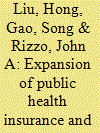| Srl | Item |
| 1 |
ID:
103906


|
|
|
|
|
| Publication |
2011.
|
| Summary/Abstract |
This paper examines the impact of the New Cooperative Medical Scheme (NCMS) on private health insurance purchasing decisions in rural China, using longitudinal data from the China Health and Nutrition Survey (CHNS, 2000-2006). A Difference-in-difference (DID) approach is employed to estimate NCMS effects. The overall effects of NCMS were modest, but differed for adults and children. We find that adults were 2.1% more likely to purchase private health insurance when NCMS became available. NCMS had a larger positive effect on adult private coverage in higher income groups and in communities with a preexisting health care financing system, known as the Cooperative Medical Scheme (CMS). We also find evidence suggesting that NCMS crowded out child private health insurance, especially in lower income groups. However, this finding is not robust to controlling for other covariates including household characteristics and availability of private insurance in the community. For both adults and children, risk preferences and socio-economic status, including income and education, are important predictors of private insurance take-up. We find no evidence for adverse selection in the demand for private health insurance.
|
|
|
|
|
|
|
|
|
|
|
|
|
|
|
|
| 2 |
ID:
144572


|
|
|
|
|
| Summary/Abstract |
Sub-national governments in China have substantial responsibility for policy development as well as for direct implementation of circumscribed policy options set out by higher levels of government, and much policy discourse emphasizes the importance of sub-national flexibility and creativity in policy implementation. Discourses of government innovation aim to encourage local initiative in policy formulation and solving of systemically-important policy problems, and policy experimentation/innovation are increasingly credited as important elements of the Chinese government toolbox in managing reform. Recent studies have tended to treat experimentation/innovation as systemic phenomena, and there are few analyses of how local governments respond to central ‘experimental’ policy frameworks and develop locally- or systemically-useful policy solutions. Given concerns around the capacity of local governments, this is highly relevant in understanding how locally-generated policy relates to systemic reform. The article presents a case study of a low tech and ‘second best’ reimbursement mechanism developed sub-nationally under the New Cooperative Medical Scheme, China’s rural health insurance framework, and its spread and incorporation into national policy. It argues for the importance of local government development of ‘appropriate’ policy mechanisms (jizhi) as underpinning central reforms and system adaptation.
|
|
|
|
|
|
|
|
|
|
|
|
|
|
|
|